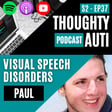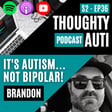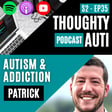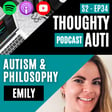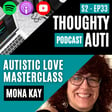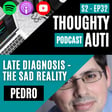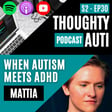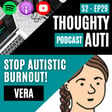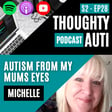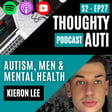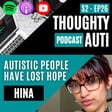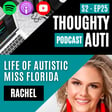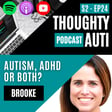
Speech & Language Pathology - Where Autism Advocacy Meets Teaching w/AlisonNV
What is Speech and Language Pathology? How does teaching shift your opinion of common teaching methods? Can the autistic experience be used for this role? Are autism-related professions accommodating of autistic people?
In this episode of the Thoughty Auti Podcast, Thomas Henley talks to @AllisonNV - An Autism advocate with a strong background in Speech & Language Pathology
They start by discussing Ally's recent diagnosis, and going into her recent battle with chronic health conditions
Soon they get into the nitty gritty of topic at hand... how teaching and using commonly hated teaching methods affects how you view autism advocacy. They both share their thoughts and experiences in the teaching world, looking objectively at the harmful ways of teaching and very best mindset for nurturing autistic children.
One of the biggest topics to highlight is the benefit of the holistic 'Pick And Choose' approach to autistic children, using the techniques and strategies from all approaches that best fit each individual. Both Thomas and Ally agree that some aspects of most teaching methods can benefit certain children, but nothing beats asking the question 'Why?' and putting the child's enjoyment/emotional wellbeing at top priority.
Lastly, Ally tells us about the poor attitudes of some of her neurotypical co-workers... she experienced some appalling behaviour where she felt heavily discriminated against due to her autistic traits. They both remark on the many superiority complexes at hand in the world of autism, where the views and experiences of autistic people are pushed aside for the more rigid approaches to autistic individuals.
Shouldn't a workplace that chiefly works with autistic children be more accommodating and understanding of autistic adults?
If you have an exciting or interesting story and want to appear on the next podcast, please contact me at: aspergersgrowth@gmail.com
Ally's Links:-
Instagram - https://www.instagram.com/allisonnv/
▬▬▬▬▬▬▬▬▬▬▬▬▬▬▬▬▬▬▬▬▬▬▬▬▬▬▬▬▬
Channel Merchandise - https://teespring.com/stores/aspergers-growth
Support via Patreon! - https://www.patreon.com/aspergersgrowth
Social Media ♥ -
☼ Facebook - Aspergers Growth
☼ Twitter/Instagram - @aspergersgrowth
♫ Listen On -
Spotify - https://open.spotify.com/show/6vjXgCB7Q3FwtQ2YqPjnEV
Apple Podcasts - https://podcasts.apple.com/gb/podcast/thoughty-auti-the-autism-mental-health-podcast/id1470689079
Music -
♫ Track: [Chill Music] Ikson - Reverie [No Copyright Music]
Advert Track: Empty Parking Lot - Colours Of Illusion [Epidemic Sound]






